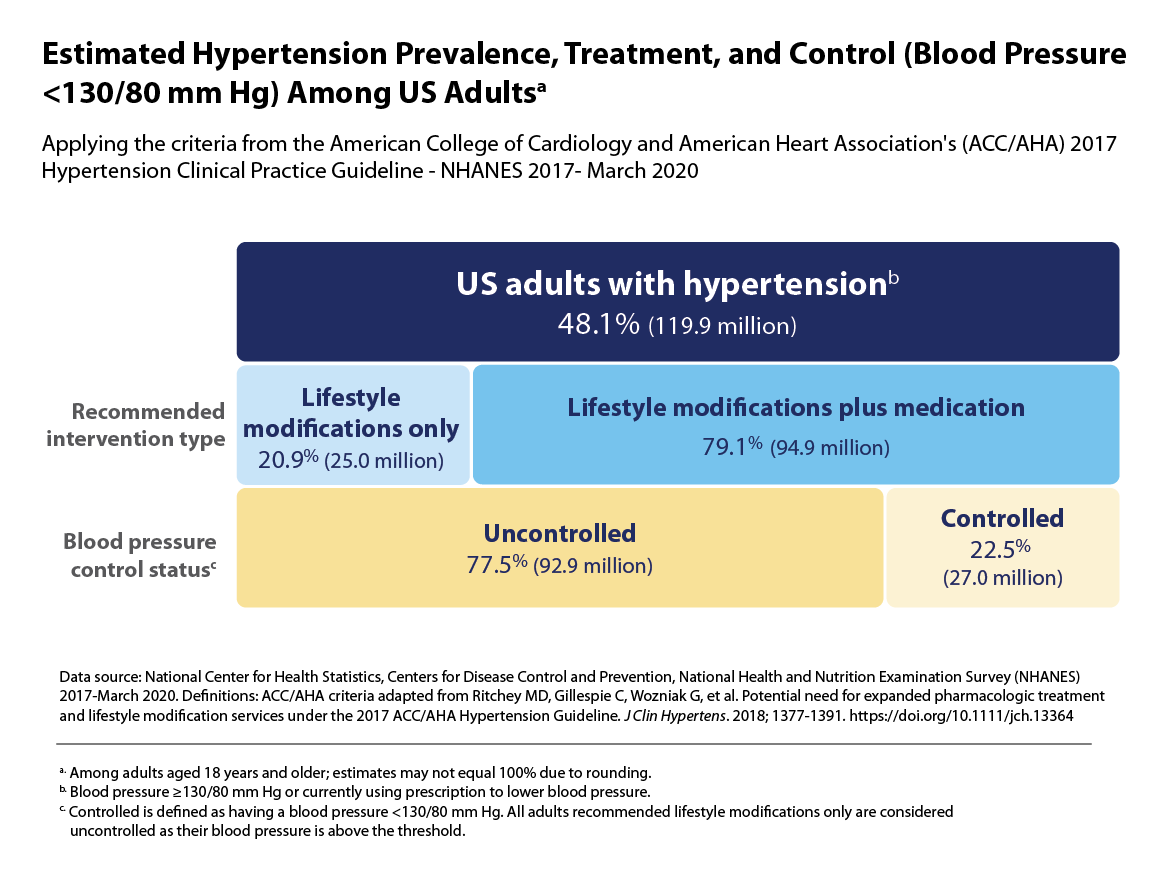Estimated Hypertension Prevalence, Treatment, and Control Among U.S. Adults
Hypertension, also known as high blood pressure, increases the risk for heart disease and stroke, two leading causes of death in the United States.1
Clinicians diagnose patients as having hypertension and make treatment decisions by comparing patients’ systolic and diastolic blood pressure readings to certain thresholds.
Current guidelines issued in 2017 by many organizations—including the American College of Cardiology (ACC) and American Heart Association (AHA)—define hypertension as blood pressure consistently at or above 130/80 mm Hg.2
Key Facts
The key facts shown in the Figure and Tables 1 and 2 [PDF – 475 KB] include the following estimates for the US adult population:
- Nearly half of adults have hypertension (119.9 million).
- About 1 in 4 adults with hypertension have their hypertension under control (27.0 million).
- All adults with hypertension are recommended by a clinician to undergo lifestyle modifications. This is the only treatment recommendation for 1 in 5 adults (25.0 million).
- Most adults with hypertension (4 in 5) are also recommended by a clinician to take prescription medication(s) (94.9 million).
- Many adults who are already treated with antihypertensive medication(s) may need to have their current medication dosage increased or to be prescribed additional medications to achieve blood pressure control (33.2 million). More than half of this group have blood pressure ≥140/90 mm Hg (18.8 million).
- Many adults for whom hypertension medication is recommended by a clinician are untreated (34.8 million). Two-thirds of this group have blood pressure of ≥140/90 mm Hg (23.4 million).
Application of the ACC/AHA 2017 Guidelines
The following figure highlights the number of US adults aged 18 and older who have hypertension. This figure applies criteria from the 2017 ACC/AHA guideline to data from the 2017 to 2020 National Health and Nutrition Examination Survey (NHANES).
The figure also shows the number of:
- People with hypertension who are recommended to use either lifestyle modifications only or lifestyle modifications with prescription medication to manage their blood pressure.
- People with hypertension who do not have their blood pressure controlled to <130/80 mm Hg.
- People with hypertension who do have their blood pressure controlled to <130/80 mm Hg.
For more information about individual subgroups, please see
- Table 1 [PDF – 475 KB]. Hypertension prevalence and control estimates among US adults aged 18 years and older applying criteria from the American College of Cardiology and American Heart Association’s (ACC/AHA) 2017 Hypertension Clinical Practice Guideline, by sex, age, and race-Hispanic origin—NHANES 2017–2020.
- Table 2 [PDF – 475 KB]. Treatment estimates among US adults aged 18 years and older with uncontrolled hypertension recommended blood pressure medication use applying criteria from the American College of Cardiology and American Heart Association’s (ACC/AHA) 2017 Hypertension Clinical Practice Guideline, by sex, age, and race-Hispanic origin—NHANES 2017–2020.
For More Information
Hypertension cascade data using NHANES 2015-2018. For more information, email MillionHearts@cdc.gov.
References
- Xu J, Murphy SL, Kockanek KD, Arias E. Mortality in the United States, 2021. NCHS Data Brief. 2022;456. Hyattsville, MD: National Center for Health Statistics.
- Whelton PK, Carey RM, Aronow WS, Casey DE, Collins KJ, Dennison C, et al. 2017 ACC/AHA/AAPA/ABC/ACPM/AGS/APhA/ASH/ASPC/NMA/PCNA Guideline for the prevention, detection, evaluation, and management of high blood pressure in adults. Hypertension. 2018;71(19):e13–115.
Suggested Citation for Figure
Hypertension Cascade: Hypertension Prevalence, Treatment and Control Estimates Among US Adults Aged 18 Years and Older Applying the Criteria From the American College of Cardiology and American Heart Association’s 2017 Hypertension Guideline—NHANES 2017–2020. Centers for Disease Control and Prevention (CDC). May 12, 2023. Accessed (specify date accessed). https://millionhearts.hhs.gov/data-reports/hypertension-prevalence.html.

